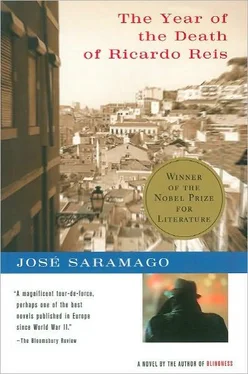José Saramago - Year of the Death of Ricardo Reis
Здесь есть возможность читать онлайн «José Saramago - Year of the Death of Ricardo Reis» весь текст электронной книги совершенно бесплатно (целиком полную версию без сокращений). В некоторых случаях можно слушать аудио, скачать через торрент в формате fb2 и присутствует краткое содержание. Год выпуска: 1992, ISBN: 1992, Издательство: Houghton Mifflin Harcourt, Жанр: Современная проза, на английском языке. Описание произведения, (предисловие) а так же отзывы посетителей доступны на портале библиотеки ЛибКат.
- Название:Year of the Death of Ricardo Reis
- Автор:
- Издательство:Houghton Mifflin Harcourt
- Жанр:
- Год:1992
- ISBN:9780547546926
- Рейтинг книги:4 / 5. Голосов: 1
-
Избранное:Добавить в избранное
- Отзывы:
-
Ваша оценка:
- 80
- 1
- 2
- 3
- 4
- 5
Year of the Death of Ricardo Reis: краткое содержание, описание и аннотация
Предлагаем к чтению аннотацию, описание, краткое содержание или предисловие (зависит от того, что написал сам автор книги «Year of the Death of Ricardo Reis»). Если вы не нашли необходимую информацию о книге — напишите в комментариях, мы постараемся отыскать её.
Year of the Death of Ricardo Reis — читать онлайн бесплатно полную книгу (весь текст) целиком
Ниже представлен текст книги, разбитый по страницам. Система сохранения места последней прочитанной страницы, позволяет с удобством читать онлайн бесплатно книгу «Year of the Death of Ricardo Reis», без необходимости каждый раз заново искать на чём Вы остановились. Поставьте закладку, и сможете в любой момент перейти на страницу, на которой закончили чтение.
Интервал:
Закладка:
As for us, we are doing fine, as fine as those wonders described above. In the land of nuestros hermanos, on the other hand, things are going from bad to worse, the family is sadly divided, Gil Robles may win the election, or Largo Caballero, and the Falange has made it clear that it will confront the Red dictatorship on the streets. In our oasis of peace we watch with regret the spectacle of a chaotic and quarrelsome Europe locked in endless debates, in political squabbles which according to Marília never achieved anything worthwhile. In France, Sarraut has now formed a Coalition Republican government and the right-wing parties have lost no time in pouncing on him, launching a hail of criticisms, accusations, and insults couched in the foul language one associates more with rowdy hooligans than with the citizens of a country that is a model of propriety and the beacon of Western culture. Thank heaven there are still voices in this continent, and powerful voices at that, who are prepared to speak out in the name of peace and harmony, we are referring to Hitler, the proclamation he made in the presence of the Brownshirts, all that Germany wants is to work in a climate of peace, let us banish once and for all mistrust and skepticism, and he dared to go further, Let the world know that Germany will pursue and cherish peace as no other nation has ever cherished it before. Indeed, two hundred and fifty thousand German soldiers are ready to occupy the Rhineland, and within the last few days a German military force invaded Czechoslovakian territory. If it is true that Juno sometimes appears in the form of a cloud, then all clouds are Juno. The life of nations, after all, consists of much barking and little biting, and you will see, God permitting, that all will end in perfect harmony. What we cannot accept is that Lloyd George should assert that Portugal has far too many colonies in comparison with Germany and Italy, when only the other day we observed public mourning to mark the death of their King George V, men in black ties and bands, women in crepe. How dare he complain that we have too many colonies, when in fact we have too few, take a look at the Pink Map of the Portuguese territories in Africa. Had that outrage been avenged as justice demanded, no one would be competing with us now, from Angola to Mozambique there would be no obstacle in our way and everything would be under the Portuguese flag, but the English, true to character, stalked us, the perfidious Albion, one doubts whether they are even capable of behaving otherwise, it is a national vice, and there is not a single nation that does not have reason to complain of them. When Fernando Pessoa turns up, Ricardo Reis must not forget to raise the interesting question as to whether colonies are a good or bad thing, not from the point of view of Lloyd George, whose sole concern is to appease Germany by handing over what other nations have acquired with considerable effort, but from his own point of view, the view of Pessoa, who revived Padre Vieira's dream by prophesying the advent of the Fifth Empire. He must also ask him, on the one hand, how he would resolve the contradiction of his own making, that Portugal has no need of colonies in order to fulfill her imperial destiny yet without them is diminished at home and abroad in material and moral terms, and, on the other hand, what he thinks of the prospect of our colonies being handed over to Germany and Italy, as Lloyd George is about to propose. What Fifth Empire will that be, when we are despoiled and betrayed, stripped like Christ on His way to Calvary, a people condemned to suffering, hands outstretched, the bonds loosely tied, for real imprisonment is the acceptance of imprisonment, hands humbly reaching to receive the alms distributed by 0 Século. Perhaps Fernando Pessoa will reply, as he has on other occasions, As you well know, I have no strong principles, today I argue for one thing, tomorrow for another, I may not believe in what I defend today or have any real faith in what I defend tomorrow. He might even add, by way of justification, For me there is no longer any today or tomorrow, how can I be expected to go on believing or expect it of others, and even if they believe, do they really know what they believe in. My vision of a Fifth Empire was vague and fanciful, why should it become a reality for you, people were too quick to believe in what I said, yet I never attempted to conceal my doubt, I would have done better to remain silent, simply looking on. As I myself have always done, Ricardo Reis will reply, and Fernando Pessoa will tell him, Only when we are dead do we become spectators, nor can we even be sure of that. I am dead and wander about, I pause on street corners, if there are people capable of seeing me, and they are rare, they will think that all I am doing is watching others pass, they do not know that if anyone falls I cannot pick him up, and yet I do not feel that I am simply looking on, all my actions, all my words continue to live, they advance beyond the street corner where I am resting, I watch them go and can do nothing to amend them, even when they are the result of an error. I cannot explain or sum up myself in a single action or word, even if only to replace doubt with negation, shadows with darkness, a yes with a no, both having the same meaning, but worse than that, perhaps they are not even the words I spoke or the actions I performed, worse because irremediable, perhaps they are the things I never did, the words I never uttered, the one word or gesture which would have given meaning to what I was. If a dead man can get so upset, death clearly does not bring peace. The only difference between life and death is that the living still have time, but the time to say that one word, to make that one gesture, is running out for them. What gesture, what word, I don't know, a man dies from not having said it, from not having made it, that is what he dies of, not from sickness, and that is why, when dead, he finds it so difficult to accept death. My dear Fernando Pessoa, you're reading things upside down. My dear Ricardo Reis, I can no longer read. Improbable on two counts, this conversation is reported as if it actually took place. There was no other way of making it sound plausible.
Since Ricardo Reis had given her no cause for jealousy other than to have conversed in public with Marcenda, albeit in a low voice, Lydia's anger could not be expected to last. First they had told her clearly that they wished nothing more, then they had waited in silence while she removed the coffee cups. This was enough to make her hands tremble. For four nights she wept into her pillow before falling asleep, not so much at the humiliation of being ig nored, after all what right had she to indulge in such tantrums, but because the doctor stopped having his breakfast in his room, he was punishing her, Why, upon my soul, when I have done nothing wrong. But on the fifth morning Ricardo Reis did not come down to breakfast, and Salvador said, Ah Lydia, take some coffee up to two hundred and one, and when she entered the room, she shook with nerves, poor girl, she could not help it. He looked at her soberly, placed his hand on her arm, and asked, Are you angry with me. She replied, No, Doctor. But you haven't been back. Lydia did not know what to say, she shrugged her shoulders, wretched, and he drew her toward him. That same night she descended to his room, but neither mentioned the reason for their separation, unthinkable that she should dare, I was jealous, or that he should condescend, My darling, what on earth possessed you, no, it could never be a conversation between equals, everybody knows that there is nothing more difficult to achieve in this world.
Nations struggle against each other on behalf of interests that are not those of Jack or Pierre or Hans or Manolo or Giuseppe, all masculine names to simplify matters, yet these and other men innocently consider those interests to be theirs, or which will be theirs at considerable cost, when the moment arrives to settle accounts. The rule is that some eat figs while others watch. People struggle for what they believe to be their values but what may be merely emotions momentarily aroused. Such is the case of Lydia, our chambermaid, and Ricardo Reis, known to everyone as a doctor of medicine, should he finally resume his practice, and to some as a poet, should he ever allow anyone to read what he painstakingly composes. But people also struggle for other reasons, for the same reasons, power, prestige, hatred, love, envy, jealousy, sheer malice, hunting grounds marked out and trespassed on, competition and rivalry, even loot, as occurred recently in the neighborhood of Mouraria. Ricardo Reis had not seen it reported, but Salvador was devouring the details avidly, his elbows resting on the opened newspaper, the pages carefully smoothed out, A dreadful business, Doctor, they're a violent lot, those people in Mouraria, they've no respect for human life, the slightest excuse and they're ready to stab each other without compassion or pity, even the police are frightened, they go in there only when it's all over, to pick up the pieces, listen to this, it says here that a certain José Reis, nicknamed José Rola, fired five shots at the head of one Antonio Mesquita, known as O Mouraria, and killed him, needless to say, no, it had nothing to do with women, the newspaper says it was a case of a quarrel over stolen goods, the one cheated the other, it happens all the time. Five shots, Ricardo Reis repeated, not to appear unconcerned, and grew pensive. He could visualize the scene, the gun firing five shots at the same target, the head receiving the first bullet while still erect, then the body on the ground spurting blood, rapidly growing weaker, and the other four bullets, superfluous yet somehow necessary, two, three, four, five, a whole barrelful of hatred in every shot, the head jerking on the pavement each time, terror and dismay on all sides, then uproar, women screaming out of the windows. It's doubtful that anyone would have had the courage to grab José Rola by the arm, most likely the bullets in the magazine were used up, or his finger suddenly froze on the trigger, or his hatred was satisfied. The assassin will escape, but he will not get far, for no one gets away with anything in Mouraria. The funeral is tomorrow, Salvador informs him, were I not on duty I would be there. Do you like funerals, Ricardo Reis asks him. It's not exactly a question of liking them, but a funeral such as this one is worth seeing, especially when there has been a crime. Ramón lives in the Rua dos Cavaleiros and he has heard rumors which he passes on to Ricardo Reis at dinnertime. The whole neighborhood is expected to turn up, Doctor, and it is even said that the cronies of José Rola are threatening to smash open the coffin, if they carry out their threat there will be merry hell, I swear by Jesus. But if O Mouraria is dead, what more can they do to him, a man like that is not likely to come back from the other world to finish what he began in this one. With people of that sort you can never tell, deep hatred doesn't end with death. I'm almost tempted to attend this funeral myself. Go, then, but don't get too close, and if there is trouble, take shelter under a staircase and let them fight it out among themselves.
Читать дальшеИнтервал:
Закладка:
Похожие книги на «Year of the Death of Ricardo Reis»
Представляем Вашему вниманию похожие книги на «Year of the Death of Ricardo Reis» списком для выбора. Мы отобрали схожую по названию и смыслу литературу в надежде предоставить читателям больше вариантов отыскать новые, интересные, ещё непрочитанные произведения.
Обсуждение, отзывы о книге «Year of the Death of Ricardo Reis» и просто собственные мнения читателей. Оставьте ваши комментарии, напишите, что Вы думаете о произведении, его смысле или главных героях. Укажите что конкретно понравилось, а что нет, и почему Вы так считаете.












